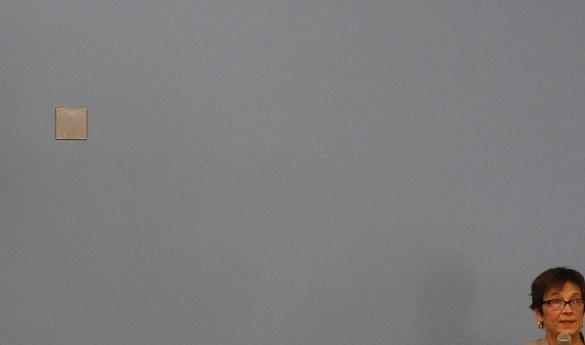Provost candidate Diane Chase delivers presentation to Mason community
The provost search committee presented Dr. Diane Chase as one of their four finalists chosen for the position of university provost on Feb. 4.
Chase, currently the executive vice provost at the University of Central Florida, is an anthropologist by training, who spent the session presenting her relevant credentials and experience, as well as answering the questions of the various Mason faculty members and staff in the audience.
“I really do have a variety of personas, like all of us,” Chase said. “There’s the me that’s in the classroom, the me that’s in the field being a researcher, and there’s the me that looks like this, with the glasses and the suit on.”
Chase made frequent allusions to her anthropological work in presenting her administrative background and credentials. She discussed her archeological work in the ancient Mayan site of Caracol and said that we are able to learn a number of lessons from this ancient society, such as shared egalitarianism, wealth accessibility and sustainability.
“There’s lots of parallels we can take from the archeology in this place in the middle of the jungle, and draw them into the present,” Chase said.
Chase’s duties as Executive Vice Provost at UCF include developing budget plans, academic program review and directly overseeing a variety of units on campus. As her successes at UCF, she listed bringing the previously divided international units together, completed a successful fifth year reporting to the Southern Association of Colleges and Schools, created a promotion path for instructors and lecturers and established an online process for uploading and reviewing promotion and tenure.
“In terms of current projects, I’m working on a project on faculty leadership development, on international sites…” Chase said. “We’re working a pathway program with a competitor to INTO, and a lot of different graduation and retention initiatives, because our concern is not just bringing in students, but making sure that they leave with that credential that they should have.”
Chase claimed that she would contribute a number of things to Mason as provost that worked in tandem with what Mason was already doing.
“…Probably more than anything else in the immediate future would be my experience with higher education in the state of Florida,” Chase said. “Where we’ve been faced with making changes and adapting quickly to external factors and trying to understand and appreciate those things in advance in terms of planning, and how interconnected things are.”
Chase also discussed the changing landscape of higher education and her belief in the value of a liberal arts education. It was important to her for students and lifelong learners to understand how we know things from different disciplinary perspectives.
“I also understand really well some of the concerns that we face in public institutions around the country…” Chase said. “[In Florida] we’re receiving a lot of questions about what is the cost of a degree, what is the value of a degree and in terms of whether we get a future funding, the kinds of performance measures we’ll need to meet.”
According to Chase, both her archeological work and her administrative work required working with a team.
“There’s no such thing as an ‘I’ in archeology,” Chase said. “I would argue that there’s no such thing as an ‘I’ in provost.”

